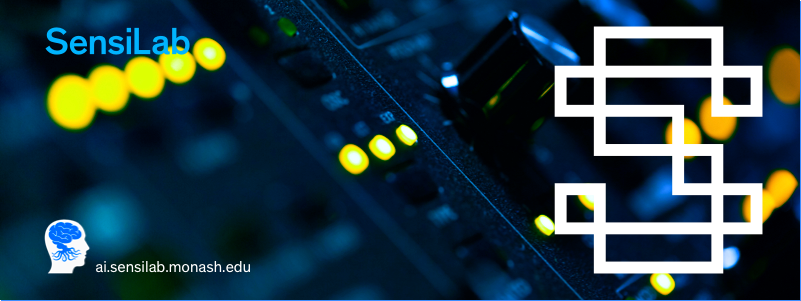
ai.sensilab is a new online resource for all things at the intersection of contemporary creative practice and AI. The site will feature hands-on tutorials, research software, datasets, news and commissioned opinion writing by leading practitioners in the field. Our aim is to provide a valuable and expansive resource for researchers, creative artists and developers working at the frontiers of technology and creativity.
While there are already many good online resources for learning and developing AI applications, we hope that our focus on creative practice will help make the platform unique. Many of us have our own creative practices – across music, sound, visual and interactive art – so for us an artistic work’s meaning and relevance is foremost, regardless of the technology, methodology or tool being used. This means that it is important to start with the creative goals of the artist and understand how technology can assist us rather than the other way around. We hope that this practice-driven approach is both a strong point of differentiation and a valuable community resource.
Creative AI
Creative AI is one of SensiLab’s four main research themes, and is a growing area of research capability within the lab. Sensilab has the only deep learning supercomputer in Australia dedicated to creative AI. Our research partnership with Nvidia gives us access to state-of-the-art high performance computing for AI, from mobile platforms for robotics to large scale deep learning and advanced GPU compute servers.
The launch of the ai.sensilab platform today coincides with the announcement that Professor Simon Colton will join SensiLab as a research Professor in Computational Creativity. Simon is well known as a leading researcher in the Computational Creativity community and will share his time between positions at Queen Mary in London and Monash in Melbourne.
Our research in Creative AI aims to design new kinds of creative systems that co-create with human artists, designers, performers and musicians. Our aim is to support, nurture and expand individual and collective creativity rather than mimic or automate human creative processes. We see AI’s role as enhancing and stimulating human creativity rather than trying beat or belittle human “opponents” through human-like mimicry or betterment.
More broadly we want to understand how AI has and increasingly will become a cultural influencer, bringing new aesthetics and ideas into creative practice. Once these aesthetics and ideas enter a broader creative culture, they can feedback onto the technical development of future systems: a hermeneutic circle of human and machine meta-creation.
We’re also interested in the concept of Post-Anthropocentric Creativity, that considers creativity beyond our familiar understandings, focusing on the agents, recipients and processes of creativity from less human-centric perspectives. Artificial Intelligences may have their own forms of creativity, which may potentially seem foreign or alien to us, yet are still appreciated for their intrinsic value.
We welcome your contributions to ai.sensilab. To find out more, or enquire about our creative AI research program, please get in touch.
The SensiLab Creative AI team
 |
 |
 |
 |
 |
|---|---|---|---|---|
| Prof. Jon McCormack | Prof. Simon Colton | Patrick Hutchings | Dilpreet Singh | Dr. Toby Gifford |
Hands on content
Posts from the SensiLab team will typically include web applets that let visitors get hands on with an AI tool or technique. While technical details and code snippets will accompany these applets for the technically curious, hands on interaction is a great way to explore this field and anyone visiting the blog should be able to dive in and learn something new.
Contributing
We welcome contributions covering all aspects of Creative AI: criticisms, new techniques, tips and tricks, project management and self reflections. We are especially interested in projects and perspectives that explore and celebrate cultural diversity.
If you would like to contribute a post, get in touch with us at sensilab@monash.edu
Follow the blog on Twitter
To encourage open discourse, ai.SensiLab post discussions will be hosted on twitter. This makes it easy for everyone to see when new posts are made, share comments and links and explore profiles of contributers for related works.